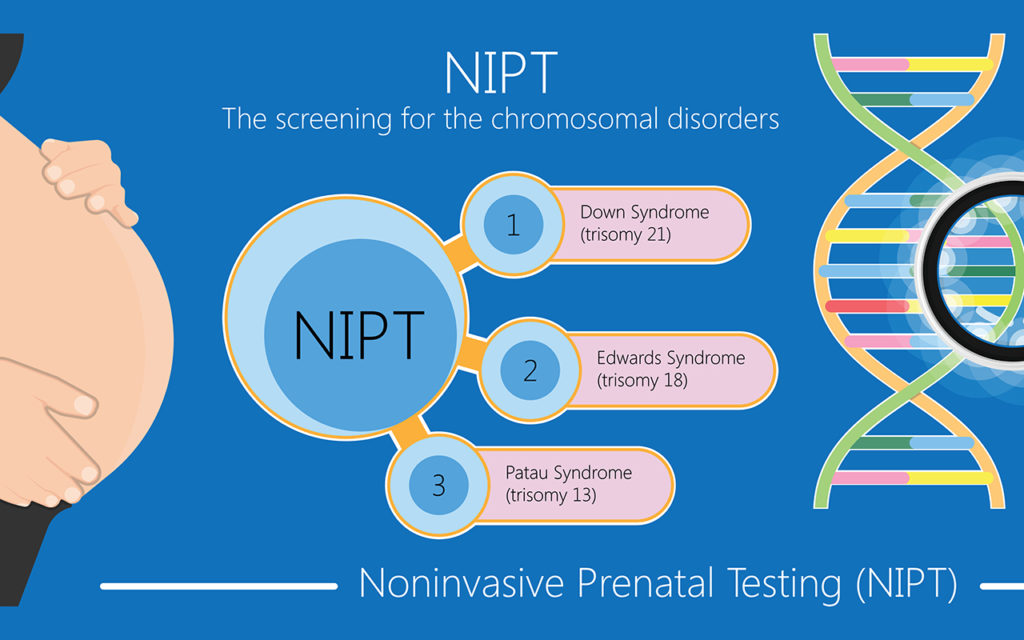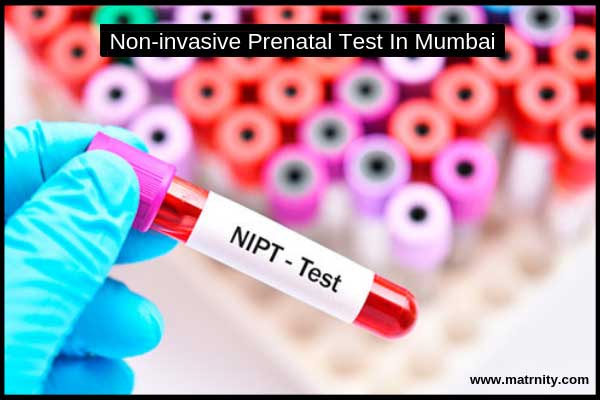Non Invasive Prenatal Testing (NIPT) :
Non Invasive prenatal testing (NIPT) using international SAGE Tm platform
Screening for fetal chromosomal abnormalities during pregnancy is an essential part of obstetrical care to reduce the burden of diseases. This is the prenatal genetic testing of fetal chromosomal aneuploidies from Mother's Blood. Noninvasive prenatal testing - uses cell free fetal DNA from the plasma of pregnant women, offers tremendous potential as a screening tool for fetal chromosomal abnormalities. It is a simple blood test which requires blood from the expectant mother after 10/11 weeks of gestation and studies the fetal DNA chromosomes for abnormalities like Down’s syndrome, Edward's Syndrome, Patau Syndrome and complete chromosomal mapping including micro deletions. Unlike Chorion villous sampling or amniocentesis (invasive procedure), NIPT carries no risk of miscarriages.
NIPT is presently an alternative to other screening tests such as double marker test, quadruple markers test and nuchal thickness on USG, as far as detecting Down syndrome is concerned. In case NIPT is positive, confirmation has to be done using Diagnostic Tests (CVS or amniocentesis) followed by appropriate genetic testing. As per latest American College of Obstetrics & Gynecology guidelines 2020, NIPT is a safe screening test which can be offered to all pregnant women and that it is more accurate than the blood based and USG based test to identify fetus with trisomy. Indications ( As per PC PNDT act GOI F form )
1. Advanced maternal age > 35 years
2. History of genetic/medical disease in the family requiring the test : Clinical/biochemical/cytogenetic (specify) or Other (eg radiological/ultrasound).
3. Previous child with of chromosomal disorders/metabolic, disorders/congenital/nomaly/mental disability/haemoglobinopathy/sex linked disorder/single-gene disorder/any other (specify).
4. Mother father, sibling has genetic disease(specify).
BAUFICI Genetics are proud to use the internationally acclaimed The Sage™ prenatal screen which is an advanced non-invasive prenatal screening solution using the latest developments in DNA technology to detect placental DNA in maternal blood. Sage™ offers a menu-based chromosome analysis to estimate the risk of a fetus having Down’s syndrome and other genetic disorders. It enables pregnant women and their families fast, safe and reliable results and reducing the need for invasive tests and the associated risks, stress and anxiety. The Sage™ workflow runs on thelatest S5 Ion Torrent sequencing system from Thermo Fisher, which is installed in our BAUFICI Genetics Laboratory.
WHAT DOES SAGE SCREEN FOR?
Sage™ has a menu-based approach to cfDNA screening, where upon consultation with the pregnant mother, the healthcare professional can select which chromosome disorders to screen for and customise it for each patient depending on their background, maternal history and wishes.
AUTOSOMAL ANEUPLOIDIES
The Sage™ prenatal screen estimates the risk of a foetus having Down’s syndrome Trisomy 21), Edwards’ syndrome (Trisomy 18) and Patau’s syndrome (Trisomy 13). The accuracy is > 99% for the detection of foetal chromosome aneuploidy. In addition, a genome-wide aneuploidy detection analysis on the remaining chromosomes can be carried out and reported.
MICRODELETIONS (ADVANCED SAGE TM TEST)
Microdeletion syndrome is caused by the absence of a small portion of genetic material in the chromosome. They can vary greatly in severity, with the symptoms of microdeletions ranging from minimal developmental delays to sever anomalies e.g. cardiac defects, neurological malformations etc. Upon request, the following rare microdeletions can be screened for:
1. DiGeorge syndrome
2. 1p36 deletion syndrome
3. Prader-Willi syndrome
4. Angelman syndrome
5. Cri-du-Chat syndrome
6. Wolf-Hirschhorn syndrome
CLINICAL PERFORMANCE
The Sage™ prenatal screen has a higher detection rate and lower false positive rate than existing screening tests. This gives pregnant women, their families and their healthcare providers greater confidence in the result and reduces the need for unnecessary invasive follow up procedures and the associated stress. Sage™ has a fast turnaround time to results, allowing pregnant women and their families to make informed choices about their pregnancy.
Aneuploidy Sensitivity Specificity PPV Trisomy 21 (Down’s syndrome) >99% 99.97% 95.06% Trisomy 18 (Edwards’ syndrome) >99% 99.98% 91.43% Trisomy 13 (Patau’s syndrome) >99% 99.98% 83.33% In a study of over 2000 samples, 6 samples were determined to be at high-risk of having an autosomal aneuploidy. This is a prevalence rate of 0.3%, which is consistent with prevalence in published studies. The Sage™ prenatal screen test report gives a clear, easy to interpret result of high or low risk. All highrisk results must receive further investigation to exclude a false-positive result.
Low Risk
It is very unlikely that the pregnancy is affected by a trisomy or aneuploidy.
High Risk
The pregnancy is at increased risk for trisomy or aneuploidy and the result should be confirmed through further investigation which may involve anDiagnostic Tests (invasive procedure such as CVS/amniocentesis.) This would be supported by Baufici Genetics in case the patient turns out to be negative after CVS/ amniocentesis.
No Result
Very occasionally there is insufficient placental DNA in the sample to obtain a result and a re-draw and testing may be required at no additional cost.
THE NEW ACOG & SFM PRACTICE BULLETIN NO 226 2020 RECOMMENDATION
All patients should be offered cfDNA screening regardless of baseline risk level.
1. Cell-free DNA testing is not equivalent to diagnostic testing.”
2. Patients who receive no call test results be counseled that they are “at an increased risk for chromosomal abnormalities.” Lab tests that report fetal fraction are preferred.
3. CfDNA labs have been offering expanded screening beyond the major trisomies (21, 18, and 13) for years, with some offering whole genome screening. PB 226 recommends when the test results report a microdeletion, it should be confirmed through diagnostic testing “as most positive results will be false-positive results because of the low prevalence of these disorders.” PB 226 does not recognize whole genome cfDNA screening as being clinically validated.




